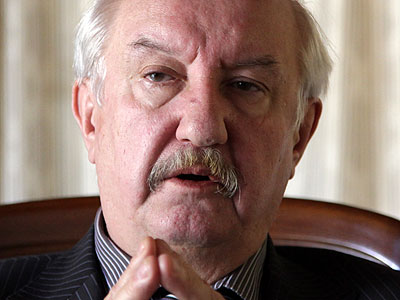Russian Federation will today mark its 20th Russia Day. This anniversary comes barely a year after marking their 50th anniversary of the cooperation between Russia and Rwanda.


Russian Federation will today mark its 20th Russia Day. This anniversary comes barely a year after marking their 50th anniversary of the cooperation between Russia and Rwanda.
The two countries have enjoyed diplomatic, trade and social ties over the years that have seen both countries continue to develop. The New Times Collins Mwai spoke to Dr Andrey Polyakov, the country’s ambassador to Rwanda on the bilateral relations and other issues such as Russia’s interests in Ukraine.
Formerly we were under the Soviet Union which split for certain reasons. Russia was among the countries that emerged from the split.
The country is relatively young, 20 years. Among the achievements sustained so far is the adoption of a new constitution, and new post of the president of Russian federation. Although the country is relatively young, it has a rich history, culture and rooted traditions.
We look forward to developing socially, economically, as well as politically and have more democracy in the Russian society. We also intend to do our best at the international level by rendering assistance to crisis and conflicts.
How has the cooperation between Rwanda and Russia faired in the recent past and what are the areas of cooperation in future?
We have had a remarkable past, the present is encouraging and the future looks bright. We have had good relations since the days when Russia was part of the Soviet Union. Amongst our areas of cooperation has been education, cadre training, medicine, teaching in higher learning institutions, and aviation among others.
For the time being, we are working on exchange of delegations at parliamentary levels and continuation of political dialogue.
Our political dialogue was enhanced since Rwanda became a member of the United Nations Security Council. The missions of our countries have always been in contacts and consultation.
Last year in October, the deputy foreign minister for the Russian federation who covers the Middle East and Africa visited Kigali and held a meeting with the president and the Minister of Foreign Affairs. These meetings laid foundation for our political contacts.
Last year, we also marked the 50th anniversary of our establishment of the diplomatic relations of the two countries. As a result of our relations and cooperation gaining impulse, the embassy of Rwanda has reopened in Moscow (in October last year).
Rwanda’s coffee and tea are doing fairly well in the Russian market.We have many fields of common interests but it might take time to develop them.
What is Russia’s take on the current crisis in the Eastern DRC region as a permanent member of UN Security Council?
We are very concerned about the escalation of tensions in the eastern region of the democratic republic of congo. Russia demands immediate cessation of hostilities. We condemn the unlawful activity of armed groups such as FDLR and other negative forces. We insist that all these groups should lay down their arms voluntarily or be disarmed by force.
Russia is chairing the UN Security Council in June 2014. What can you say about Russia’s priorities during its tenure?
For the month of June, Russia will hold chairmanship of the UN Security Council taking over from Korea and will be succeeded by Rwanda in July.
The agenda during this time will include a summit in Afghanistan and a number of meetings on African issues. These issues will include discussions over the Islamist insurgency in Mali and the instability in South Sudan
Rwanda recently marked the 20th commemoration of the 1994 Genocide against the Tutsi and is set to mark liberation day. What can you say about the intervention in conflicts that threaten to destroy nations?
The 1994 Genocide against the Tutsi was an enormous tragedy not only for Rwandan but the rest of the world. Unfortunately, the United Nations and the rest of the international community did not pay much attention to the circumstances that led to the tragedy.
From the various discussions during the commemoration time, the international community agreed to draw lessons from the Genocide and make sure that genocide never happens anywhere else again.
The response to such conflicts should be rapid as the Rwandan peacekeepers have demonstrated in various missions across the world.
What is Russia’s interest in neighbouring Ukraine?
We share in Ukraine’s pain. They are our neighbours and we were one during the time of the Soviet Union. Many Russian families have relatives in Ukraine and vice-versa. But now there is bloodshed in the East and southern part of Ukraine.
What should be done is to stop bloodshed and go into dialogue. We hope these hostilities will stop and there will be no more victims especially among children and women.
The international coverage of what is going on in Ukraine was for a while not factual and was one sided, but now things are changing. Independent journalists are relaying facts as they are.


